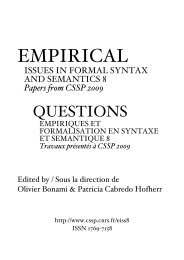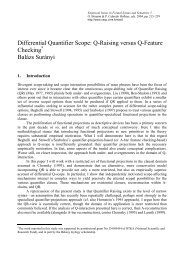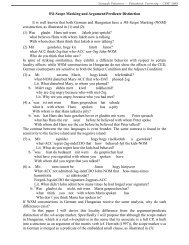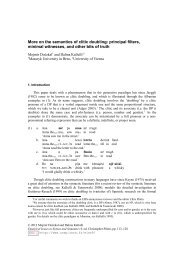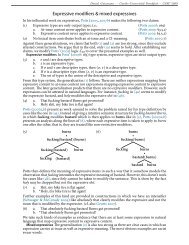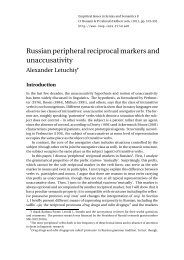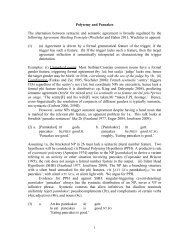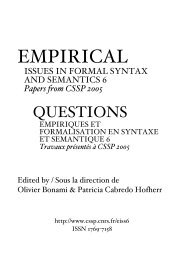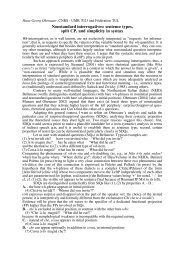Empirical Issues in Syntax and Semantics 9 (EISS 9 ... - CSSP - CNRS
Empirical Issues in Syntax and Semantics 9 (EISS 9 ... - CSSP - CNRS
Empirical Issues in Syntax and Semantics 9 (EISS 9 ... - CSSP - CNRS
Create successful ePaper yourself
Turn your PDF publications into a flip-book with our unique Google optimized e-Paper software.
DPs headed by weak determ<strong>in</strong>ers, except those headed by ‘no’ <strong>and</strong> bare nouns, may also be<br />
clitic doubled <strong>in</strong> Albanian, <strong>in</strong> which case the doubled DP <strong>in</strong>variably has wide scope. 5 An<br />
<strong>in</strong>stance of clitic doubl<strong>in</strong>g with a weak quantifier was already provided <strong>in</strong> (1d); other examples<br />
are given <strong>in</strong> (4).<br />
(4) Javën e shkuar (i) lexova dy / tre / disa / ca libra.<br />
week.the past them CL.ACC read.I two / three / some / a few books<br />
‘Last week I read two books/some books.’<br />
(5) Nuk (*/??e) lexova asnjë libër.<br />
not CL.ACC.3S read-I not.one book<br />
‘I didn’t read any book’<br />
As we explicate below, the fact that DPs headed by weak determ<strong>in</strong>ers can be clitic doubled<br />
is unexpected under the only available semantic analysis of clitic doubl<strong>in</strong>g <strong>in</strong> the literature,<br />
namely, the one <strong>in</strong> Gutiérrez-Rexach 1999 on clitic doubl<strong>in</strong>g of direct objects <strong>in</strong> Spanish, which<br />
is outl<strong>in</strong>ed <strong>in</strong> the follow<strong>in</strong>g subsection. 6<br />
2.2. Gutiérrez-Rexach 1999<br />
Gutiérrez-Rexach (1999) claims that accusative DPs <strong>in</strong> Spanish are clitic doubled if <strong>and</strong><br />
only if they denote pr<strong>in</strong>cipal filters. That is, direct object clitic doubl<strong>in</strong>g is accord<strong>in</strong>g to him<br />
subject to the constra<strong>in</strong>t <strong>in</strong> (6), with ‘pr<strong>in</strong>cipal filter’ def<strong>in</strong>ed as <strong>in</strong> (7):<br />
(6) The Pr<strong>in</strong>cipal Filter Constra<strong>in</strong>t:<br />
The generalized quantifier associated with an accusative clitic has to be a pr<strong>in</strong>cipal filter.<br />
(Gutiérrez-Rexach 1999:326)<br />
(7) A generalized quantifier Q over E is a pr<strong>in</strong>cipal filter iff there is not necessarily empty set<br />
A ⊆ E, such that for all B ⊆ E, Q(B) = 1 iff A ⊆ B. The set A is called the generator of Q<br />
(A=GEN(Q)). (Gutiérrez-Rexach 1999:326)<br />
The problem with this analysis is that s<strong>in</strong>ce weak quantifiers can never denote pr<strong>in</strong>cipal<br />
filters, as is obvious from the orig<strong>in</strong>al def<strong>in</strong>ition of pr<strong>in</strong>cipal filter <strong>in</strong> Barwise & Cooper<br />
1981:183 given below <strong>in</strong> (8), clitic doubl<strong>in</strong>g them should not be possible, contrary to fact.<br />
(8) Def<strong>in</strong>ition. A determ<strong>in</strong>er D is def<strong>in</strong>ite if for every model M = <strong>and</strong> every A which<br />
⟦D⟧(A) is def<strong>in</strong>ed, there is a non-empty set B, so that ⟦D⟧(A) is the sieve {X ⊆ E | B ⊆<br />
X}. (Hence ⟦D⟧(A) is what is usually called the pr<strong>in</strong>cipal filter generated by B.)<br />
Specifically, the def<strong>in</strong>ition <strong>in</strong> (8) states that for a quantifier to be a pr<strong>in</strong>cipal filter, for every<br />
model there must be a non-empty set B (the set cannot be empty because it is the sieve) which<br />
belongs to the set of sets denoted by the quantifier X. To illustrate, consider the figures <strong>in</strong> (9),<br />
which show why every is a positive strong determ<strong>in</strong>er (which generates the pr<strong>in</strong>cipal filter for<br />
the set <strong>in</strong> its restriction) but two is a weak determ<strong>in</strong>er <strong>and</strong> can as such never denote a pr<strong>in</strong>cipal<br />
5<br />
Follow<strong>in</strong>g Kallulli 2000 <strong>and</strong> related literature, we assume that bare nouns cannot be doubled because<br />
while clitics are D-elements (alternatively: carry a D-feature), bare nouns lack a D-projection, which results <strong>in</strong><br />
a feature mismatch caus<strong>in</strong>g the derivation to crash.<br />
6<br />
As Gutiérrez-Rexach acknowledges, clitic doubl<strong>in</strong>g is possible with weak determ<strong>in</strong>ers <strong>in</strong> Spanish, too.<br />
115



